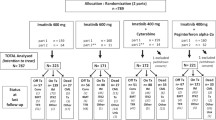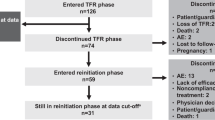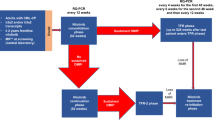Abstract
A minority of chronic myeloid leukemia (CML) patients is capable of successfully discontinuing imatinib. Treatment modalities to increase this proportion are currently unknown. Here, we assessed the role of interferon alpha 2a (IFN) on therapy discontinuation in a previously reported cohort of 20 chronic phase CML patients who were treated upfront with IFN alpha plus imatinib followed by IFN monotherapy to maintain cytogenetic or molecular remission (MR) after imatinib discontinuation. After a median follow-up of 7.9 years (range, 5.2–12.2), relapse-free survival was 73% (8/11 patients) and 84% (5/6 patients) for patients who discontinued imatinib in major MR (MMR) and MR4/MR4.5, respectively. Ten patients discontinued IFN after a median of 4.5 years (range, 0.24–9.3). After a median of 2.8 years (range, 0.7–5.1), nine of them remain in ongoing treatment-free remission with MR5 (n=6) and MR4.5 (n=3). The four patients who still administer IFN are in stable MR5, MR4.5, MR4, and MMR, respectively. In conclusion, an IFN/imatinib induction treatment followed by a temporary IFN maintenance therapy may enable a high rate of treatment discontinuation in CML patients in at least MMR when stopping imatinib.
This is a preview of subscription content, access via your institution
Access options
Subscribe to this journal
Receive 12 print issues and online access
$259.00 per year
only $21.58 per issue
Buy this article
- Purchase on Springer Link
- Instant access to full article PDF
Prices may be subject to local taxes which are calculated during checkout



Similar content being viewed by others
References
Hehlmann R, Müller MC, Lauseker M, Hanfstein B, Fabarius A, Schreiber A et al. Deep molecular response is reached by the majority of patients treated with imatinib, predicts survival, and is achieved more quickly by optimized high-dose imatinib: results from the randomized CML-study IV. J Clin Oncol 2013; 32: 415–423.
Branford S, Yeung DT, Ross DM, Prime JA, Field CR, Altamura HK et al. Early molecular response and female sex strongly predict stable undetectable BCR-ABL1, the criteria for imatinib discontinuation in patients with CML. Blood 2013; 121: 3818–3824.
Baccarani M, Deininger MW, Rosti G, Hochhaus A, Soverini S, Apperley JF et al. European LeukemiaNet recommendations for the management of chronic myeloid leukemia. Blood 2013; 122: 872–884.
Koskenvesa P, Kreutzman A, Rohon P, Pihlman M, Vakkila E, Räsänen A et al. Imatinib and pegylated IFN-α2b discontinuation in first-line chronic myeloid leukemia patients following a major molecular response. Eur J Haematol 2014; 92: 413–420.
Talpaz M, Kantarjian HM, McCredie KB, Keating MJ, Trujillo J, Gutterman J . Clinical investigation of human alpha interferon in chronic myelogenous leukemia. Blood 1987; 69: 1280–1288.
Talpaz M, Kantarjian HM, McCredie K, Trujillo JM, Keating MJ, Gutterman JU . Hematologic remission and cytogenetic improvement induced by recombinant human interferon alpha A in chronic myelogenous leukemia. N Engl J Med 1986; 314: 1065–1069.
Hehlmann R, Heimpel H, Hasford J, Kolb H-J, Pralle H, Hossfeld DK et al. Randomized comparison of interferon-alpha with busulfan and hydroxyurea in chronic myelogenous leukemia. The German CML Study Group. Blood 1994; 84: 4064–4077.
Guilhot F, Chastang C, Michallet M, Guerci A, Harousseau JL, Maloisel F et al. Interferon alfa-2b combined with cytarabine versus interferon alone in chronic myelogenous leukemia. French Chronic Myeloid Leukemia Study Group. N Engl J Med 1997; 337: 223–229.
Hughes TP, Kaeda J, Branford S, Rudzki Z, Hochhaus A, Hensley ML et al. Frequency of major molecular responses to imatinib or interferon alfa plus cytarabine in newly diagnosed chronic myeloid leukemia. N Engl J Med 2003; 349: 1423–1432.
Hochhaus A, Reiter A, Saußele S, Reichert A, Emig M, Kaeda J et al. Molecular heterogeneity in complete cytogenetic responders after interferon-alpha therapy for chronic myelogenous leukemia: low levels of minimal residual disease are associated with continuing remission. German CML Study Group and the UK MRC CML Study Group. Blood 2000; 95: 62–66.
Bonifazi F, de Vivo A, Rosti G, Guilhot F, Guilhot J, Trabacchi E et al. Chronic myeloid leukemia and interferon-alpha: a study of complete cytogenetic responders. Blood 2001; 98: 3074–3081.
Mahon FX, Delbrel X, Cony-Makhoul P, Fabères C, Boiron JM, Barthe C et al. Follow-up of complete cytogenetic remission in patients with chronic myeloid leukemia after cessation of interferon alfa. J Clin Oncol 2002; 20: 214–220.
Cortes J, O'Brien S, Kantarjian H . Discontinuation of imatinib therapy after achieving a molecular response. Blood 2004; 104: 2204–2205.
Mauro MJ, Druker BJ, Maziarz RT . Divergent clinical outcome in two CML patients who discontinued imatinib therapy after achieving a molecular remission. Leukemia Res 2004; 28: S71–S73.
Rousselot P, Charbonnier A, Cony-Makhoul P, Agape P, Nicolini FE, Varet B et al. Loss of major molecular response as a trigger for restarting tyrosine kinase inhibitor therapy in patients with chronic-phase chronic myelogenous leukemia who have stopped imatinib after durable undetectable disease. J Clin Oncol 2013; 32: 424–430.
Mahon F-X, Réa D, Guilhot J, Guilhot F, Huguet F, Nicolini F et al. Discontinuation of imatinib in patients with chronic myeloid leukaemia who have maintained complete molecular remission for at least 2 years: the prospective, multicentre Stop Imatinib (STIM) trial. Lancet Oncol 2010; 11: 1029–1035.
Ross DM, Branford S, Seymour JF, Schwarer AP, Arthur C, Yeung DT et al. Safety and efficacy of imatinib cessation for CML patients with stable undetectable minimal residual disease: results from the TWISTER study. Blood 2013; 122: 515–522.
Merante S, Orlandi E, Bernasconi P, Calatroni S, Boni M, Lazzarino M . Outcome of four patients with chronic myeloid leukemia after imatinib mesylate discontinuation. Haematologica 2005; 90: 979–981.
Rousselot P, Huguet F, Réa D, Legros L, Cayuela JM, Maarek O et al. Imatinib mesylate discontinuation in patients with chronic myelogenous leukemia in complete molecular remission for more than 2 years. Blood 2007; 109: 58–60.
Burchert A, Wölfl S, Schmidt M, Brendel C, Denecke B, Cai D et al. Interferon-alpha, but not the ABL-kinase inhibitor imatinib (STI571), induces expression of myeloblastin and a specific T-cell response in chronic myeloid leukemia. Blood 2003; 101: 259–264.
Molldrem JJ, Lee PP, Wang C, Felio K, Kantarjian HM, Champlin RE et al. Evidence that specific T lymphocytes may participate in the elimination of chronic myelogenous leukemia. Nat Med 2000; 6: 1018–1023.
Molldrem JJ, Lee PP, Kant S, Wieder E, Jiang W, Lu S et al. Chronic myelogenous leukemia shapes host immunity by selective deletion of high-avidity leukemia-specific T cells. J Clin Invest 2003; 111: 639–647.
Kreutzman A, Rohon P, Faber E, Indrak K, Juvonen V, Kairisto V et al. Chronic myeloid leukemia patients in prolonged remission following interferon-α monotherapy have distinct cytokine and oligoclonal lymphocyte profile. PLoS ONE 2011; 6: e23022.
Baccarani M, Martinelli G, Rosti G, Trabacchi E, Testoni N, Bassi S et al. Imatinib and pegylated human recombinant interferon-alpha2b in early chronic-phase chronic myeloid leukemia. Blood 2004; 104: 4245–4251.
Preudhomme C, Guilhot J, Nicolini FE, Guerci-Bresler A, Rigal-Huguet F, Maloisel F et al. Imatinib plus peginterferon alfa-2a in chronic myeloid leukemia. N Engl J Med 2010; 363: 2511–2521.
Simonsson B, Gedde-Dahl T, Markevärn B, Remes K, Stentoft J, Almqvist A et al. Combination of pegylated IFN-α2b with imatinib increases molecular response rates in patients with low- or intermediate-risk chronic myeloid leukemia. Blood 2011; 118: 3228–3235.
Hehlmann R, Lauseker M, Jung-Munkwitz S, Leitner A, Müller MC, Pletsch N et al. Tolerability-adapted imatinib 800 mg/d versus 400 mg/d versus 400 mg/d plus interferon-α in newly diagnosed chronic myeloid leukemia. J Clin Oncol 2011; 29: 1634–1642.
Burchert A, Müller MC, Kostrewa P, Erben P, Bostel T, Liebler S et al. Sustained molecular response with interferon alfa maintenance after induction therapy with imatinib plus interferon alfa in patients with chronic myeloid leukemia. J Clin Oncol 2010; 28: 1429–1435.
Müller MC, Cross NCP, Erben P, Schenk T, Hanfstein B, Ernst T et al. Harmonization of molecular monitoring of CML therapy in Europe. Leukemia 2009; 23: 1957–1963.
Hughes T, Deininger M, Hochhaus A, Branford S, Radich J, Kaeda J et al. Monitoring CML patients responding to treatment with tyrosine kinase inhibitors: review and recommendations for harmonizing current methodology for detecting BCR-ABL transcripts and kinase domain mutations and for expressing results. Blood 2006; 108: 28–37.
Cross NCP, White HE, Müller MC, Saglio G, Hochhaus A . Standardized definitions of molecular response in chronic myeloid leukemia. Leukemia 2012; 26: 2172–2175.
Burchert A . Maintaining low BCR-ABL signaling output to restrict CML progression and enable persistence. Curr Hematol Malig Rep 2014; 9: 9–16.
O'Hare T, Zabriskie MS, Eiring AM, Deininger MW . Pushing the limits of targeted therapy in chronic myeloid leukaemia. Nat Rev Cancer 2012; 12: 513–526.
Nicolini FE, Etienne G, Dubruille V, Roy L, Huguet F, Legros L et al. Nilotinib and peginterferon alfa-2a for newly diagnosed chronic-phase chronic myeloid leukaemia (NiloPeg): a multicentre, non-randomised, open-label phase 2 study. Lancet Haematol 2015; 2: e37–e46.
Faderl S, Talpaz M, Estrov Z, Kantarjian HM . Chronic myelogenous leukemia: biology and therapy. Ann Intern Med 1999; 131: 207–219.
Acknowledgements
This work was supported by the Deutsche José Carreras Leukämiestiftung (03/01; AR12/12 and AH06/01), to AH, AB and AN, respectively, by the Deutsche Forschungsgemeinschaft, KFO210 (BU 1321/3-1 to A.B. and NE 310/14-1 to A.N.), and by a research grant of the University Medical Center Gießen and Marburg (to AB). Research support was received from Roche, Grenzach Wyhlen, Germany (to AB and AH).
Author information
Authors and Affiliations
Corresponding author
Ethics declarations
Competing interests
Andreas Burchert: advisory Board Pfizer; Honoraria Bristol Meyers Squibb (BMS), Susanne Saussele: honoraria and Travel support BMS, Novartis, Ekkehard Eigendorff: honoraria and travel support Novartis, BMS, Ariad, Martin C. Müller: research support, honoraria and advisory role: Novartis, BMS, Ariad, Rüdiger Hehlmann: research support Novartis and BMS, Andreas Hochhaus: research support, honoraria and advisory role: Novartis, BMS, Ariad, Pfizer. The remaining authors declare no conflict of interest.
Rights and permissions
About this article
Cite this article
Burchert, A., Saussele, S., Eigendorff, E. et al. Interferon alpha 2 maintenance therapy may enable high rates of treatment discontinuation in chronic myeloid leukemia. Leukemia 29, 1331–1335 (2015). https://doi.org/10.1038/leu.2015.45
Received:
Revised:
Accepted:
Published:
Issue Date:
DOI: https://doi.org/10.1038/leu.2015.45
This article is cited by
-
Imatinib Analogs in Chronic Myeloid Leukemia: a Systematic Qualitative Review
Current Pharmacology Reports (2023)
-
Discontinuation of Tyrosine Kinase Inhibitors in Patients with Chronic Myeloid Leukemia: a Review of the Biological Factors Associated with Treatment-Free Remission
Current Oncology Reports (2022)
-
Improving outcomes in chronic myeloid leukemia through harnessing the immunological landscape
Leukemia (2021)
-
Flow cytometry and targeted immune transcriptomics identify distinct profiles in patients with chronic myeloid leukemia receiving tyrosine kinase inhibitors with or without interferon-α
Journal of Translational Medicine (2020)
-
Treatment-free remission after first-line dasatinib treatment in patients with chronic myeloid leukemia in the chronic phase: the D-NewS Study of the Kanto CML Study Group
International Journal of Hematology (2020)



